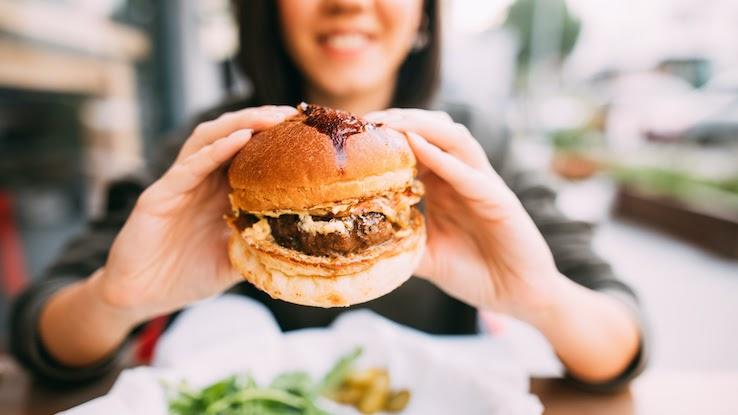
Acid reflux, also known as heartburn or indigestion, describes the feeling of digestive acid from the stomach flowing back up into the esophagus or throat. This painful condition can cause the sensation of burning in the chest or throat, difficulty swallowing, coughing and chest pain. Recurring episodes of reflux may lead to difficulty sleeping, a sore throat (laryngitis), breathing symptoms that feel like asthma or a long-lasting cough. When diagnosed by a physician, acid reflux is known as gastroesophageal reflux disease (GERD).
Because GERD involves digestive fluid, the foods you eat can play a role in whether you experience acid reflux — and how often. If you have GERD, eating the right foods and avoiding those that are more likely to trigger acid reflux may help you control your symptoms.
Acid Reflux Risk Factors and Effects
GERD is associated with several risk factors, including obesity and certain connective tissue disorders. Pregnancy can also increase your likelihood of developing GERD. Some people find that smoking, taking certain medications, eating fried foods or drinking certain beverages can aggravate their symptoms of acid reflux.

It’s important that you seek medical attention if you’re experiencing recurrent episodes of acid reflux. Over time, the presence of stomach acid in your esophagus can cause inflammation, and this can lead to more severe problems such as ulcers (open sores), narrowing of the esophageal passage due to scar tissue formation and an increased risk of esophageal cancer.
Most commonly, people who have acid reflux experience symptoms daily or weekly. However, it’s possible to manage the uncomfortable symptoms of acid reflux by making lifestyle and diet changes. More severe cases may require medications for effective management. The foods and beverages that you choose may have a large impact on the severity and occurrence of your acid reflux symptoms. Avoiding known trigger foods and drinks may lessen the severity or frequency of the GERD symptoms you experience.
Acid Reflux Foods to Avoid
There are some obvious triggers of acid reflux, such as spicy, greasy and fatty foods. While these are important to avoid, there are some others that may not be as easy to identify as being triggers. The following foods may be more likely to cause acid reflux:

High-fat foods
Pizza
Fast food
Fried food
French fries
Potato chips
Chocolate
Bacon, sausage and other fatty meats
Doughnuts and pastries
Processed snacks
High-acid foods
Tomatoes or tomato sauces
Citrus fruits (orange, lemon, lime, grapefruit)
Ketchup
Spicy Foods
Peppers
Chili powder
Hot sauce
Beverages
Caffeinated coffee
Caffeinated tea
Alcohol
Carbonated or fizzy beverages
Healthy Foods to Enjoy
Fortunately, there are plenty of delicious foods that are safe for people with acid reflux to eat. Because acidic fruits, veggies, spicy foods and high-fat dishes are the main triggers for acid reflux, it’s important to look for alternatives to these foods, such as the following:

Foods High in Fiber
Whole grain oatmeal
Whole grain brown rice
Potatoes
Carrots
Broccoli
Beets
Asparagus
Lean Meats
Skinless chicken breast
Extra-lean ground turkey
Extra-lean ground beef
Fish
Non-Acidic Fruits
Apples
Bananas
Strawberries
Melons
High-water-content Foods (Can Dilute Stomach Acid)
Watermelon
Cucumbers
Lettuce
Celery
These choices may help alleviate the symptoms of acid reflux and also improve your overall health by increasing your metabolism, strengthening your immune system and giving your body the nutrients it needs to function at its best.
Your diet does not have to be “all or nothing.” If you’re craving a trigger food, try to find a tasty substitute for it. For example, look for low-fat options of your favorite foods. You might try roasting your own potatoes with salt and pepper rather than choosing potato chips or french fries.
Tips to Prevent Acid Reflux
Many people experience acid reflux when they lie down to go to sleep. To prevent this, make sure you finish eating any snacks or meals at least three hours before going to bed. This gives the food enough time to pass through your stomach and can prevent acid reflux symptoms. Additionally, eating large meals in one sitting can be a trigger for acid reflux. This is due to the fact that large meals can create pressure in your stomach, which may force acid up into your esophagus. Eat smaller meals throughout the day to allow more time for your food to digest and to lessen pressure in your stomach.

Smokers have an increased risk of GERD, so if you smoke, it might be helpful to cut down or stop. Speak to your healthcare provider for help in quitting. If you are overweight, you might find that losing weight may lessen or even eliminate your symptoms.
Acid reflux is an uncomfortable condition to experience. However, it can be helped in some cases with diet and lifestyle changes. You may even be able to eliminate your acid reflux symptoms entirely, though some more severe cases require medication. Speak to your healthcare provider to learn more.
Resource Links:
https://www.mayoclinic.org/diseases-conditions/gerd/symptoms-causes/syc-20361940
https://www.mayoclinic.org/diseases-conditions/gerd/diagnosis-treatment/drc-20361959
https://www.fishertitus.org/health/foods-to-avoid-with-gerd
https://pubmed.ncbi.nlm.nih.gov/26053301/





